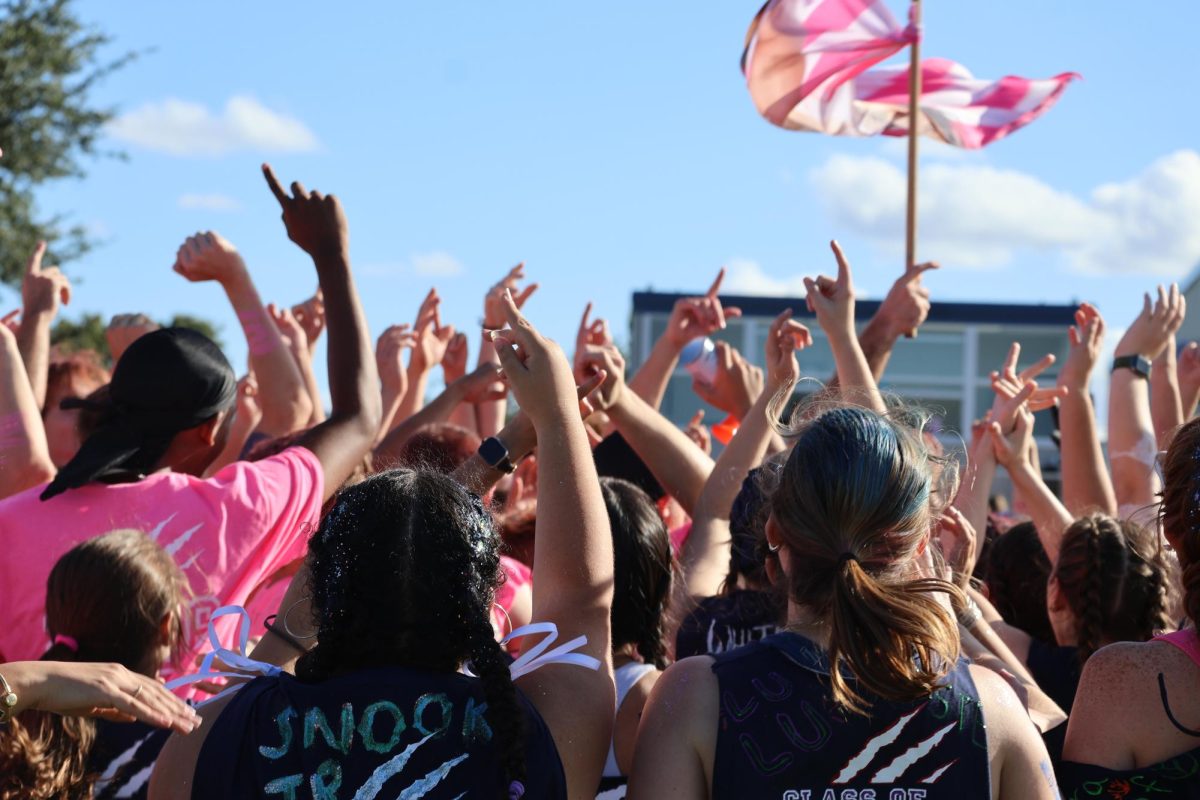The school’s new theater teacher Caroline Miller visited New York City last summer, just in time for yet another actors strike, which began July 14 and came to a close on Sept. 27.
Since the introduction of artificial intelligence into the film industry in the 2000s, producers and directors have realized AI can replace such labor positions such as writing scripts and generating faces and voices, decreasing the amount of money needed to pay humans. This has recently become the reality for those in the film industry, creating a longterm impact on the creation of film.
“It’s really important because writers are very undervalued,” Miller said. “Especially with how greedy the entertainment industry is and how writers are taken advantage of, especially songwriters. They don’t make as much money as the people that are performing, and really, those people wouldn’t have those opportunities if it weren’t for the writers.”
Hannah Williams, an actor and friend of Miller, was personally affected by the strike as she was in the midst of working in the second season of the Apple TV series “Severance.”
“When the [Screen Actor Guild] went on strike, it led to the industry-wide shutdown, because even if the scripts are already written, you can’t film anything without the actors,” Williams said. “Every day was unclear. We’d show up to work wondering whether or not there would be a picket line. As soon as one person is picketing, it is considered a picket line.”
Williams said that although the strike was resolved by an agreement between the SAG and producers, it still greatly affected the production process and actors’ attitudes on set because the issues run deeper than low wages.
“As far as the impact that the strike has had on me, it has felt emblematic of the nature of the industry in general, a clear indication that the industry needs to change,” Williams said. “It is a wonderful industry to work in, and I love what I do and wouldn’t trade it for anything, but it is rooted so deeply in hierarchical dynamics, and in the past 20 or so years, it has become less about the quality of the art being made and more about the quantity of the profit margins.”
According to the Writers Guild of America, during the past decade, writers’ pay decreased by 23 percent. Because of this drop in pay, members of the Screen Actors Guild and American Federation of Television and Radio Artists began to strike against what they believe to be an unfair wage.
“Why would they pay an actual person a living wage to make a movie when they can just get a robot to do it for way cheaper?” senior and former film club member Lillian Goodman said. “It’s messed up. This is a direct result of capitalism and greed because these companies don’t care about the quality of the product. They know that they can get the AI to make a product cheaper than a human being. It won’t be as good, but people will still go watch it out of curiosity and out of loyalty to that franchise. ”
Goodman said larger corporations are not as concerned with quality as they are with quantity.
“Disney can probably tell that if they just put out a movie, and it has Marvel on it, and it has the superheroes, people will go pay and see it no matter what,” Goodman said. “At this point, there’s so many of those movies that it would be easy for an AI to follow an algorithm and write a movie, but it would be so artificial and void of any human mark on it that it would be soulless.”
Goodman said she takes into account her personal definition of art when evaluating the use of AI in the writing process.
“Art is not art if it’s made by a robot,” Goodman said. “Humans make mistakes because we’re not perfect, but that’s what makes things beautiful and enjoyable. Comparing to something written by AI, things that are written by actual people are bound to be better, even if it isn’t good. I would much rather have a product made by a human being with a soul who is getting paid more to do it, even if I end up paying more for the product in the end or wait longer, if that’s what it takes.”
As a result of the strike, the release of more than 50 television shows have been postponed. Among these is the popular HBO Max series “Euphoria”, whose release date of the new season has been pushed back as far as 2026. As the strike draws to a close, productions that had been on hold are expected to resume shortly, bringing relief to industry workers and avid viewers alike. However, the releases remain postponed. Senior Anna Vittitoe said she is disheartened that she has long awaited this release, only for it to have been dramatically delayed.
“I’ve been a fan of the show since 2020, and each year, I have waited patiently for the next season,” Vittitoe said, “It’s super-disappointing that we won’t get a new season due to the actors’ strike. The show has lost such amazing people, which will already make a huge difference, as well as the limited story lines they have to choose from. I will still watch Season 3, but I am disappointed that that won’t be the case for a while.”
The annual televised Broadway award show “The Tony Awards” also impacted.
“Even the Tony’s, they had no script for it because of the strike. They had to just improv off of it,” Miller said. “I think that lost a lot of viewers this year, too. I thought they did a good job. Everyone’s just trying to do the best they can.”
Miller reflected on the future of not only the film industry but all careers with the expansion of technology.
“How are people going to have jobs?” Miller said. “How is the world going to be sustainable if we’re just depending on technology?”
Categories:
Robo-artists
Artificial intelligence proliferation threatens future of writers, actors
Evy Nigh, Staff Writer
October 19, 2023
More to Discover
About the Contributor

Evy Nigh, Entertainment Editor
Hi! I’m Evy, this is my third year on the Roar. I am the entertainment editor and am so excited for my senior year and all it brings! I am a competitive dancer and instructor at Heather’s dance studio. I love music (especially Frank Ocean), my friends, and Spiderman.


![Sophomore Isabelle Gaudry walks through the metal detector, monitored by School Resource Officer Valerie Butler, on Aug. 13. “I think [the students have] been adjusting really well," Butler said. "We've had no issues, no snafus. Everything's been running smoothly, and we've been getting kids to class on time.”](https://westshoreroar.com/wp-content/uploads/2025/08/IMG_9979-1200x800.jpg)


































